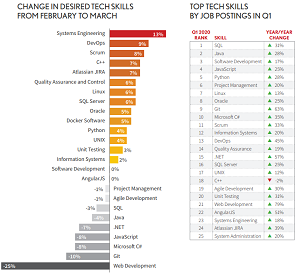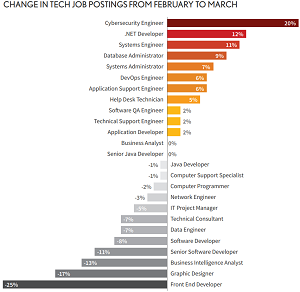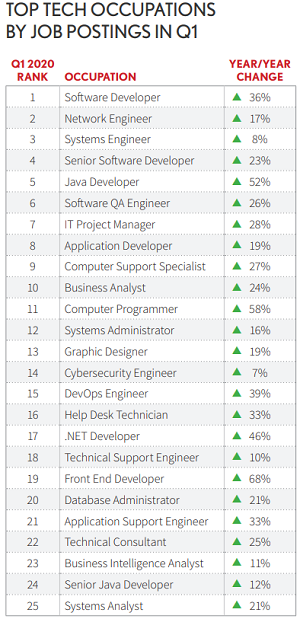News
Tech Job Report Gauges COVID-19 Impact: Desire for .NET, C# Skills Decreases
Tech careers firm Dice's latest job report attempts to gauge the early impact of the COVID-19 pandemic on hiring. One finding of special interest to Visual Studio Magazine readers is less desire for .NET and C# skills.
The Dice "Q1 Tech Job Report" addresses location data, employers, occupations and skills, presenting three different sets of job-posting data:
- Comparisons between the first quarter of 2019 and 2020.
- Comparisons between February and March of 2020 to represent COVID-19’s impact on the tech industry thus far.
- Weekly job posting volume from Jan. 4 to April 11 to provide a more granular look at the weekly fluctuations in tech job postings.
"While some employers have ramped up their technology hiring, others have halted immediate hiring of non-essential roles... or rescinded initial offers," Dice said. "Our analysis suggests that the initial impact is less severe in tech than other industries, even as COVID-19 fundamentally changes day-to-day life across the country."
Although the "Change in Desired Tech Skills from February to March" chart is just one small part of the overall report, it finds that desire for .NET skills decreased by 7 percent, while desire for C# skills decreased by 8 percent. The only skills faring worse were Git and web development.
 [Click on image for larger view.] Skills Charts (source: Dice).
[Click on image for larger view.] Skills Charts (source: Dice).
At the other end, the desire for systems engineering skills increased 13 percent, followed by DevOps (9 percent) and Scrum (8 percent).
One Microsoft-centric skill, SQL Server, increased by 6 percent.
VSM readers probably shouldn't be too alarmed, though, as another chart (shown in the graphic above) shows a 35 percent increase in job postings for C# in 2020's first quarter compared to the same period in 2019. .NET postings increased even more, by 57 percent. The only skill with fewer job postings was C++.
 [Click on image for larger view.] Job Postings from February to March (source: Dice).
[Click on image for larger view.] Job Postings from February to March (source: Dice).
Yet another chart tracking the change in tech job postings from February to March shows .NET developer (presumably using mostly C#) postings increased by 12 percent, as shown in the preceding graphic.
Tracking top tech job occupations by job postings in Q1 2020 as compared to 2019 shows .NET developer postings increased by 46 percent, as shown here:
 [Click on image for larger view.] Job Postings (source: Dice).
[Click on image for larger view.] Job Postings (source: Dice).
"With the rise of COVID-19, employers are wrestling with a great deal of uncertainty, and, as a result, the growth (and decline) of tech skills was varied between February and March. One thing is clear, though: Employers are very interested in skills that contribute to the maintenance and shifting of a company’s technology infrastructure."
VSM readers can dig more into the data by going here.
About the Author
David Ramel is an editor and writer at Converge 360.